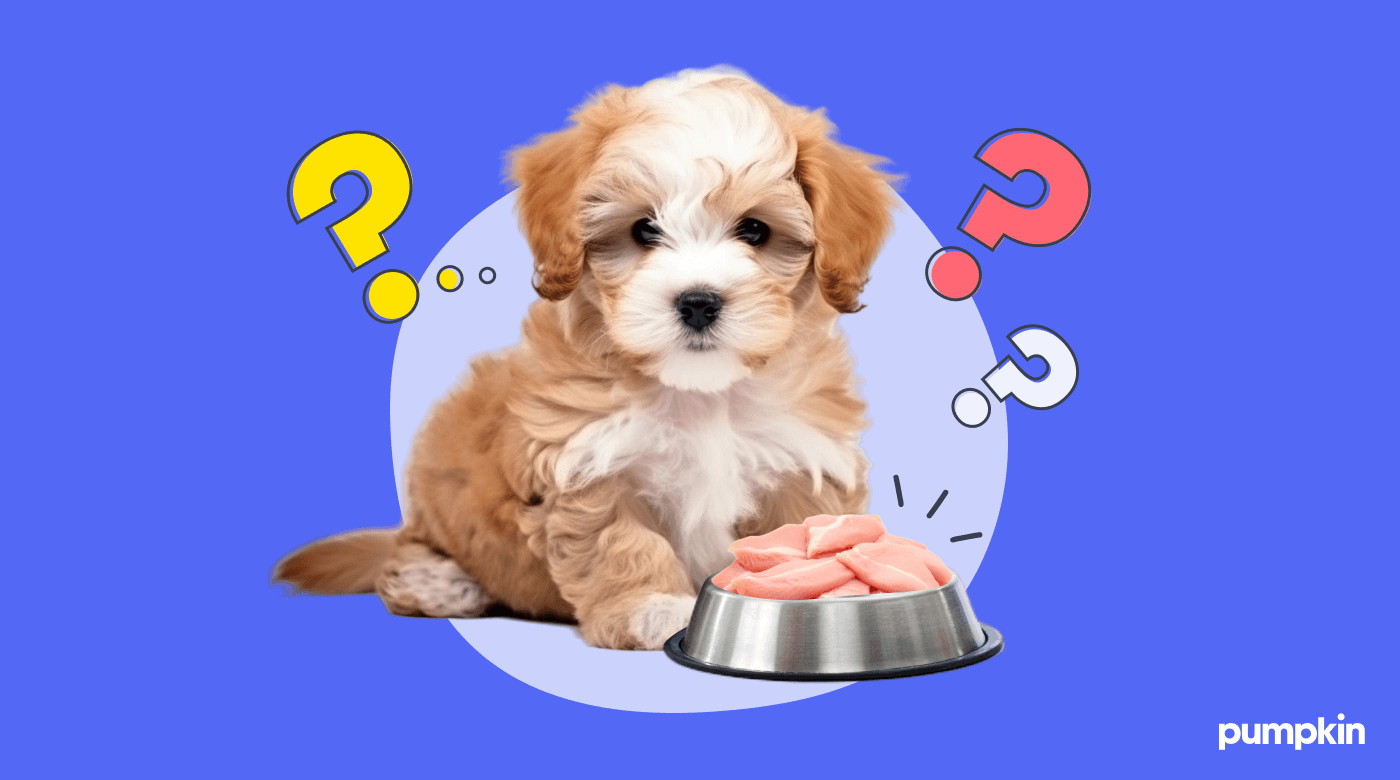Key Points
- Dogs can eat raw chicken, but there are also serious risks such as bacterial contamination.
- Proponents of a raw diet for dogs argue that raw chicken has health benefits and provides essential nutrients.
- Moderation, safe handling, and proper preparation are important when feeding your dog any raw meats.
Only the most hardcore paleo dieters would even consider eating raw chicken, but you know dogs will eat anything you leave within paw’s reach.
Whether your dog took a chomp of something they shouldn’t have, or you’ve been reading about raw food diets for pets and want to learn more, you may wonder if raw chicken is safe for dogs to eat.
Raw chicken can be safe for your dog to eat, meaning it’s not toxic. However, feeding raw meat to your dog carries serious risks, and raw chicken can make your pup sick. That’s why some veterinarians recommend avoiding all raw meats, even as more pet parents embrace raw diets.
In this guide, we’ll dive into everything you need to know about raw chicken for dogs, the risks and benefits, and how to prepare it safely.
Is raw chicken good for dogs?
Lean meats like chicken and turkey are very beneficial for our dogs. Raw chicken isn’t inherently toxic to dogs, but it carries the risk of bacterial contamination, such as Salmonella or Campylobacter, which can lead to food poisoning.
Some proponents of a raw food diet for dogs argue that dogs’ digestive systems are equipped to handle bacteria better than humans, but this is a topic of ongoing debate in the veterinary community.
The nutritional value of raw chicken
Raw chicken is a cheap and lean source of protein, which is just one reason some dog parents want to add it to the dinner bowl.
Raw chicken breast is rich in amino acids, fatty acids, and protein, with over 22 grams per 100 grams of meat. It’s also low in fat and contains no carbohydrates.
Beyond protein, it includes vital nutrients that are important to both human and dog health:
- Niacin: This mineral, also known as vitamin B3, promotes healthy and active digestion
- Selenium: Selenium supports thyroid health in both dogs and humans
- Potassium: Potassium maintains muscle health and heart health
- Phosphorous: This mineral supports bone health and helps produce healthy cells
- Magnesium: This powerhouse mineral promotes healthy immune function and 300 other bodily processes
There is a difference between white and dark meat though. Dark meat like chicken thighs and drumsticks is higher in calories and fat but also contains additional nutrients like iron, riboflavin, zinc, and vitamin B12.

Does the nutritional value of chicken change when cooked?
When cooked, the nutritional content of chicken changes very little. The vitamins and minerals found within can withstand a careful cooking process.
When cooked properly, any bacteria within the chicken meat will be destroyed by heat. Considering this, cooked chicken is a much safer way to add healthy protein to your dog’s diet.
Benefits of raw chicken for your dog
Veterinarian Dr. Lea Stogdale, writing in The Canadian Veterinary Journal, states that dogs fed a raw food diet maintain a healthy body weight and are less likely to be overweight. Additionally, a raw food diet may also be a good option for dogs with food allergies, as commercial dog foods may trigger allergic reactions.
Pet owners who have switched to a raw diet for dogs argue that raw chicken provides a range of extra health benefits to their pups. These owners report that a raw food diet provides their pups with:
- Healthy muscles and bones
- Higher energy levels
- Shinier coats
- Cleaner teeth
- Regular bowel movements
At this time, there are limited studies exploring the health benefits of feeding a raw meat diet to dogs. A 2021 study published in the American Society of Animal Science did find a “slight improvement” in health outcomes in dogs fed a raw meat-based diet instead of kibble. However, this improvement could have been caused by other factors. The study noted that dogs in the raw food group were more likely to participate in sporting activities or take veterinary supplements, for instance.
Because this is a new topic in the veterinary world, consult with your veterinarian on whether including raw meat in your dog’s diet is right for them.
The risks of dogs eating raw chicken
Feeding raw chicken to dogs comes with risks. The primary risk is exposure to harmful bacteria such as Salmonella or Campylobacter, which can lead to food poisoning.
Symptoms of food poisoning in dogs include vomiting, diarrhea, fever, and lethargy. In severe cases, it can be fatal.
Raw meat may also contain parasites and antibiotic-resistant bacteria that can cause ongoing health issues in pets and people alike.
Chicken allergies
Chicken or poultry is one of the most common food allergies in dogs. When feeding your dog chicken for the first time, make sure to watch out for any signs of an allergic reaction, including:
- Itching
- Hives
- Trouble breathing
- Indigestion
- Ear infections
- Gas
- Vomiting
- Obsessive licking
- Skin infection
- Rash
If you think your dog is having an allergic reaction, contact your vet as soon as possible.
Malnutrition risks
Pet owners who are creating a raw meat diet on their own may inadvertently miss out on important nutrients.
Veterinarian Sarah J. Wooten, DVM, CVJ, told Pumpkin, “Malnutrition is a risk due to inexpert formulation of diet. Dogs have a specific list of nutrients that they need in specific quantities. Raw diets that are fed to dogs without the guidance of a canine nutritional expert like a board-certified veterinary nutritionist run the risk of being nutritionally inadequate and imbalanced, leading to malnutrition over time.”
Can puppies eat raw chicken?

Raw chicken also presents a risk of bacterial infection for puppies. A puppy’s immune system is not fully developed, so they may be at greater risk of health issues compared to adult dogs.
How to prepare raw chicken for dogs
If you decide to feed your dog raw chicken meat, you should take some precautions:
- Buy meat from poultry farms that routinely check for Salmonella and other bacterial infections
- Thaw from frozen, in the fridge, and only the amount your dog will eat over 3-5 days
- Remove all bones, as they’re prone to splintering and can damage your dog’s intestinal tract
- Remove excess chicken skin, which is very high in fat and can lead to health issues like pancreatitis and obesity over time
- Discard any uneaten chicken after an hour and thoroughly clean your dog’s food bowl
Make sure you share only unseasoned chicken without added salts, seasonings, or marinades as these can be harmful for dogs.
If your dog eats raw chicken and later shows signs of illness, contact your veterinarian or the Pet Poison Control Helpline. Your dog may be experiencing food poisoning due to bacterial contamination.
In addition to your dog’s health, watch out for your own! Handling raw meat, especially raw chicken, exposes you to harmful bacteria like Salmonella. Always follow the U.S. Food and Drug Administration’s guidelines on safely handling raw meat.
Can dogs eat other raw meats?
If the risk of Salmonella poisoning is your key concern and you still want to try feeding raw meat to your dog, avoid chicken and opt for raw beef instead. Stick to cuts of meat directly from the butcher and trim off the outside layer that has been in contact with the air.
Moderation is still important, as raw beef is higher in fat and calories than chicken.
Turkey and other poultry share the same potential risks as chicken. Raw pork also contains higher risks of parasites and should be avoided.
What about raw ground chicken, turkey, or beef? Dr. Wooten advised that she warns against feeding raw ground meat of any kind to dogs or cats. She told Pumpkin, “Ground meats have more problems with bacterial contamination than their whole meat counterparts.”
Finally, remember that all raw meats carry the risk of bacterial contamination. Always consult with your veterinarian before introducing new foods into your dog’s diet. If the risks of feeding your dog raw chicken are just too high, there are plenty of other human food alternatives to share with your pooch instead.
Safe alternatives to raw meat
The best alternative to raw chicken for dogs? Cooked chicken! Prepare it without seasoning by baking, frying, or boiling it. Make sure it’s cooked to a safe temperature to eliminate any harmful bacteria.
Cooked beef and pork are also great protein-rich alternatives to their raw versions.
Besides meat, try these healthy snacks for dogs:
- Eggs
- Plain yogurt
- Carrots
- Apples (without seeds)
- Blueberries
- Sweet potatoes
- Pumpkin
- Green beans
To protect your dog’s health, discuss any changes to their diet with a veterinarian.
So, is raw chicken safe for dogs?
While the ancestors of modern-day domestic dogs did eat raw meat, our domesticated pups are hardly ancient, wild predators. They are omnivores that evolved alongside people to eat meat, cereal grains, and vegetables.
Adding raw meat to the diet carries the risk of bacterial contamination, which can lead to serious health problems. Safer alternatives, such as cooked chicken or other lean meats, can be just as enjoyable for your dog and much less risky.
Pet Pro Tip: If you have a dog that is prone to ‘snacksidents’ – you should consider getting a dog insurance plan as soon as possible. It can help you afford the best care in the future by covering eligible vet bills for digestive illnesses, toxic ingestion, and more.
Updated on January 28, 2025: This article was updated after being reviewed by a veterinarian. We also added new information from a study on the potential health benefits of raw meat-based diets for dogs, as well as a new section on the risks of malnutrition.
FAQs
-
- https://perfectlyrawsome.com/raw-feeding-knowledgebase/biologically-appropriate-raw-food-barf-adult-dogs/
- https://www.researchgate.net/publication/367114634_Effect_of_cooking_methods_on_nutritional_quality_of_chicken_meat
- https://fdc.nal.usda.gov/fdc-app.html#/food-details/171077/nutrients
- https://www.petmd.com/dog/conditions/cardiovascular/c_dg_hyperphosphatemia
- https://www.petmd.com/blogs/nutritionnuggets/dr-coates/2015/october/what-magnesium-and-why-it-important-33238
- https://www.fitday.com/fitness-articles/nutrition/healthy-eating/how-preperation-affects-chicken-nutrition.html
- https://www.ncbi.nlm.nih.gov/books/NBK218177/
- https://www.ncbi.nlm.nih.gov/pmc/articles/PMC6515799/
- https://pubmed.ncbi.nlm.nih.gov/24261804/
- https://www.ncbi.nlm.nih.gov/pmc/articles/PMC6505760/
- https://pubmed.ncbi.nlm.nih.gov/31025713/
- https://wagwalking.com/condition/poultry-allergies
- https://www.fda.gov/food/buy-store-serve-safe-food/safe-food-handling
- https://pmc.ncbi.nlm.nih.gov/articles/PMC8174467/




